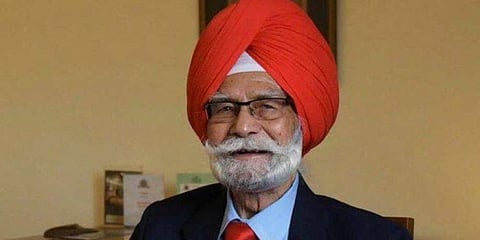

CHENNAI: India has lost a giant. Seventy-one years and nine months after the tri-color was hoisted for the first time at a multi-discipline event, the 1948 Olympic Games in London, Balbir Singh Dosanjh breathed his last at a private hospital in Mohali on Monday. Commonly referred to as Balbir Singh Senior, he was the architect behind independent India's first great sporting moment. He was 95 and is survived by a daughter and three sons.
The impact he had was evident as tributes poured in from sportspersons, hockey fans and politicians. At a time when the country is divided into several fronts, Balbir's legacy ensured that a fractured nation came together as one to say farewell to one of its first and greatest sporting sons.
Even if the country has produced many great hockey players — Dhyan Chand being the greatest of them all — Balbir stood out because of his ability to make the stick bend to his wishes. Many people who watched him in the flesh make the point that it was nothing short of a magic wand in his hands.
Even though his main job on the field was to score goals — he did that an awful lot — he wasn't half bad playing as a creator. His passing skills were such that he would set up goals for fun; he was, for all intents and purposes, a player blessed with otherworldly abilities that weren't to be found in coaching manuals. Forget walking on ice, Balbir routinely composed haiku on grass and gravel for over a decade as he provided independent India an identity as a hockey superpower, something it craves in the 21st century.
Even if he came into public consciousness for the first time in 1948, he had already seen many unspeakable things by then. Born in Moga in Punjab, Balbir, who was an officer with the Punjab Police then, had seen firsthand the horrors of Partition. In an interview to ESPN in 2017, he had detailed what he saw. "Blood everywhere. Murders. Disturbances. Fights. Everything was burning. Every few hours, we (police) would be sent somewhere. It is so strange to believe now. We are friends one day and all of a sudden we become enemies."
Son of a freedom fighter, Balbir wasn't fond of the police while growing up. He had seen cops arresting his father multiple times and he himself was handcuffed after he refused to be drafted into the Punjab Police a few years before independence. John Bennet, inspector general of Punjab Police, presented him with two options: go behind bars or play for us. He picked the latter and did not look back. Months after joining the team, he helped Punjab to their first national title in 14 years.
One of the effects of Partition was the breaking up of the national team. His friends, the ones who would pass the ball to him in matches, had suddenly become Pakistanis. Both the national team as well as the Punjab outfit had splintered. It was in this background that the team left for London for the first Olympics since 1936. India's honour in the sport was at stake, they had won it in 1928, 1932 and 1936 but this was her chance to win a first-ever gold as an independent nation.
With the nation learning to walk on its own and still coming to terms with Partition, Balbir provided a soothing balm in the final. Playing Great Britain — "India's old masters" as described by himself — the then 23-year-old scored a brace to give an infant nation an immense source of pride three days before the first anniversary of the Independence Day.
The gold acted as a booster shot. After the team came back, Bombay rolled out reception for the ages. "Bombay literally rolled out its biggest red carpet," he had noted in his autobiography, 'The Golden Hat-trick — My Golden Days'. "Hockey was the only sport that gave the country a ray of golden hope, something to cheer for and celebrate."
ALSO READ: Balbir Singh Sr - A legacy written in gold
Such was his talent that he helped the country to more Olympic titles. In fact, in the final against the Netherlands in 1952, he scored five times, a record that still stands. Four years later, he captained the team to another gold. With his legacy set in stone, it was no surprise when the International Olympic Committee (IOC) recognised the centre-forward as one of the world's 16 Olympic icons in the Games' modern history.
In 1975, he once again proved his worth, this time as an administrator. He was the manager of the team when India won the World Cup in 1975, after coaching them to a bronze medal in 1971. A few members of the team have only good things to say about him. One player, who played under him, says his greatest trait was unifying the team and not allowing players to be bogged down by external factors. Indeed. One of his constant messages when he coached and managed was 'Bharat mata ki jai'.
A lion among men, the memories he left behind will continue to inspire people for generations to come.